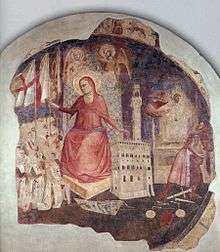Walter VI, Count of Brienne

Walter VI (c. 1304 – 19 September 1356) was Count of Brienne, Conversano, and Lecce, and titular Duke of Athens as Walter II.
Life
Early life in Italy
Walter was the son of Walter V, Duke of Athens, and Jeanne de Châtillon (died 1354), the daughter of the Count of Porcien, Constable to King Philip IV of France.[1]
As grandson of Hugh of Brienne (d. 1296), he was heir to a vast property all around the Mediterranean. After his father's death at the Battle of Halmyros on 15 March 1311, Walter became Count of Brienne, etc., and Duke of Athens. However, all of the Duchy except for Argos and Nauplia in the Principality of Achaea had been overrun by the Catalan Company, and Walter spent much of his life in an unsuccessful struggle to recover that inheritance of his grandmother's family.[1] He spent most of his life in Italy and France and left Argos-Nauplia to be ruled by guardians.
The Duchy of Athens was not the first loss in his family: Walter's grandfather had been rejected from the succession of the kingdoms of Jerusalem and Cyprus, and his great-great-grandfather had been Pretender of the throne of Sicily, as husband of the sister of William III of Sicily. They had barely regained the County of Lecce, and were still claiming the Principality of Taranto.
His mother Jeanne carried out a vigorous struggle against the Catalans during his minority, which, however, had little military effect but impoverished him. To strengthen his position, Walter engaged in a strategic marriage to Margaret, the niece of King Robert of Naples and daughter of Philip I of Taranto by Thamar Angelina Komnene, in December 1325. At this time, Florence requested King Robert's support in protecting Guelph interests in Italy, and elected his son, Charles, Duke of Calabria, as signore of Florence for a ten-year period (1326–36). Walter VI's almost-princely position in the Angevin court soon won him an appointment as Vicar for Charles of Calabria, an office that he only exercised for a few months in 1325.[1]
Anti-Catalan crusade of 1331–1332
After 1321, Walter repeatedly announced his intention to campaign in Greece and recover the Duchy of Athens, but financial constraints and his obligations to the King of Naples kept him occupied in Italy.[2] In 1328, he even briefly concluded a truce with the Catalans. Thus it was not until 1330 that a serious effort got under way. In June 1330, Pope John XXII issued a crusading bull for Walter, and ordered prelates in Italy and Greece to preach for a crusade against the Catalans; shortly after, King Robert of Naples also gave the crusade his support, and allowed his feudatories to join it. The Venetians, on the other hand, renewed their treaty with the Catalans in April 1331. Sailing from Brindisi in August, Walter attacked first the Latin County palatine of Cephalonia and Zakynthos, and the Greek Despotate of Epirus, forcing them to recognize the overlordship of King Robert. He also seized the island of Leucas and the mainland castle of Vonitsa for himself in the process. From there he proceeded to invade the Duchy of Athens through northern Boeotia, but his campaign was a failure as the Catalans avoided battle and withdrew behind the walls of Thebes and Athens. Walter had neither the troops to overwhelm the Catalans nor the money to sustain a prolonged war of sieges and attrition, and found no support among the native Greek population. By summer 1332, it was clear that the expedition had failed, and Walter returned to Brindisi, saddled with even more crippling debts.[3][4]
In his new Greek domains of Leucas and Vonitsa, Walter initially appointed a series of French castellans. In 1343, he made the Venetian Graziano Zorzi, who had helped finance his 1331 expedition and joined it himself, governor of Leucas. Zorzi proved successful in this role, and in October 1355, Walter granted Leucas as well as Vonitsa to him as a fief.[5]
Ruler of Florence

He also occupied himself with his lands in France, and was the King's Lieutenant in Thiérache in 1339. His wife died in 1340, and he returned to Italy in 1342 when the Florentine ruling class of wealthy merchants called upon him to rule the city. Since 1339, Florence had been in the grip of a severe economic crisis brought about by immense English debts to Florentine banking houses, and by astronomical public debts incurred in trying to obtain the nearby city of Lucca from its Veronese lord, Mastino della Scala. The Florentine nobility looked to foreign powers to solve the city's seemingly impossible financial problems, and found an ally in Walter of Brienne. Although the ruling class invited Walter to rule for a limited time, the lower classes, who were fed up with the ineptitude of Walter's predecessors, unexpectedly proclaimed him signore for life.
Walter VI ruled despotically, ignoring or directly opposing the interests of the very same merchant class that had brought him to power. The "Duke of Athens" imposed harsh economic correctives on the Florentines, including the flat tax estimo, and prestanze, postponements of the city's repayment of loans forced from the wealthier citizens. These measures both angered the Florentines, and helped alleviate the fiscal crisis that had been stewing for years. After only ten months, Walter of Brienne's signoria was cut short by conspiracy. Walter VI was not only forced to resign from office, but barely escaped Florence with his life.
Later life and death
In 1344 he married Jeanne, the daughter of Raoul I of Brienne, Count of Eu. She bore him two daughters, Jeanne and Marguerite, both of whom died young. As he had no surviving children, it was evident that his sister's issue would inherit his possessions and claims. He was appointed Constable of France in 1356 and in that capacity died on 19 September 1356 at the Battle of Poitiers. He was succeeded in his titles and pretensions by his sister Isabella and her sons. As he had left Greece, his eldest surviving nephew Sohier d'Enghien was holding the lordship of Argos and Nauplia. When the inheritance was divided after Walter VI's death, Isabella's sixth son Guy d'Enghien received the Greek lordship.
Isabella III survived her brother and died 1360. Her husband Gauthier d'Enghien had died in 1345. For a few years, she became Countess of Lecce and Brienne, etc., as well as titular Duchess of Athens and of other claimed titles. Since her eldest son Gauthier had died before Walter, her heir was her second son Sohier of Enghien. She allowed her inherited lands to be divided between her numerous children during her own lifetime (see Brienne claim to the Kingdom of Jerusalem for her descendants).
Cultural legacy
The "Duke of Athens" who appears in the seventh tale of Day Two of the Decameron as one of the nine lovers of the Sultan of Babylon's daughter, while not historically accurate, is probably a satirical allusion to Walter VI - his brief, but unforgettable dictatorship in Florence occurred less than ten years before the writing of the Decameron.
References
- 1 2 3 Crum, Roger J., "Brienne, Walter of", Medieval Italy, (Christopher Kleinhenz, ed.), Routledge, 2004 ISBN 9781135948801
- ↑ Luttrell 1966, pp. 35–36.
- ↑ Luttrell 1966, p. 36.
- ↑ Setton 1976, p. 452.
- ↑ Nicol 2010, pp. 133–134.
Sources
- The History of Florence from the Founding of the City through the Renaissance, New York: Harcourt Brace, 1936. pp. 217–225.
- Luttrell, Anthony (1966). "The Latins of Argos and Nauplia: 1311-1394". Papers of the British School at Rome. British School at Rome. 34: 34–55. JSTOR 40310660.
- Nicol, Donald MacGillivray (2010). The Despotate of Epiros 1267–1479: A Contribution to the History of Greece in the Middle Ages. Cambridge: Cambridge University Press. ISBN 978-0-521-13089-9.
- Sestan, Ernesto (1972). "BRIENNE, Gualtieri di". Dizionario Biografico degli Italiani, Volume 14: Branchi–Buffetti (in Italian). Rome: Istituto dell'Enciclopedia Italiana. Retrieved 9 March 2018.
- Setton, Kenneth M. (1976). The Papacy and the Levant (1204–1571), Volume I: The Thirteenth and Fourteenth Centuries. Philadelphia, Pennsylvania: The American Philosophical Society. ISBN 0-87169-114-0.
External links
| French nobility | ||
|---|---|---|
| Preceded by Walter V |
— TITULAR — Duke of Athens 1311–1356 |
Succeeded by Isabella with Sohier of Enghien |
| Count of Brienne 1311–1356 | ||
| Lord of Argos and Nauplia 1311–1356 |
Succeeded by Guy | |
| Preceded by John II Orsini as Despot of Epirus |
Lord of Lefkada and Vonitsa 1331–1355 |
Succeeded by Graziano Giorgio |
